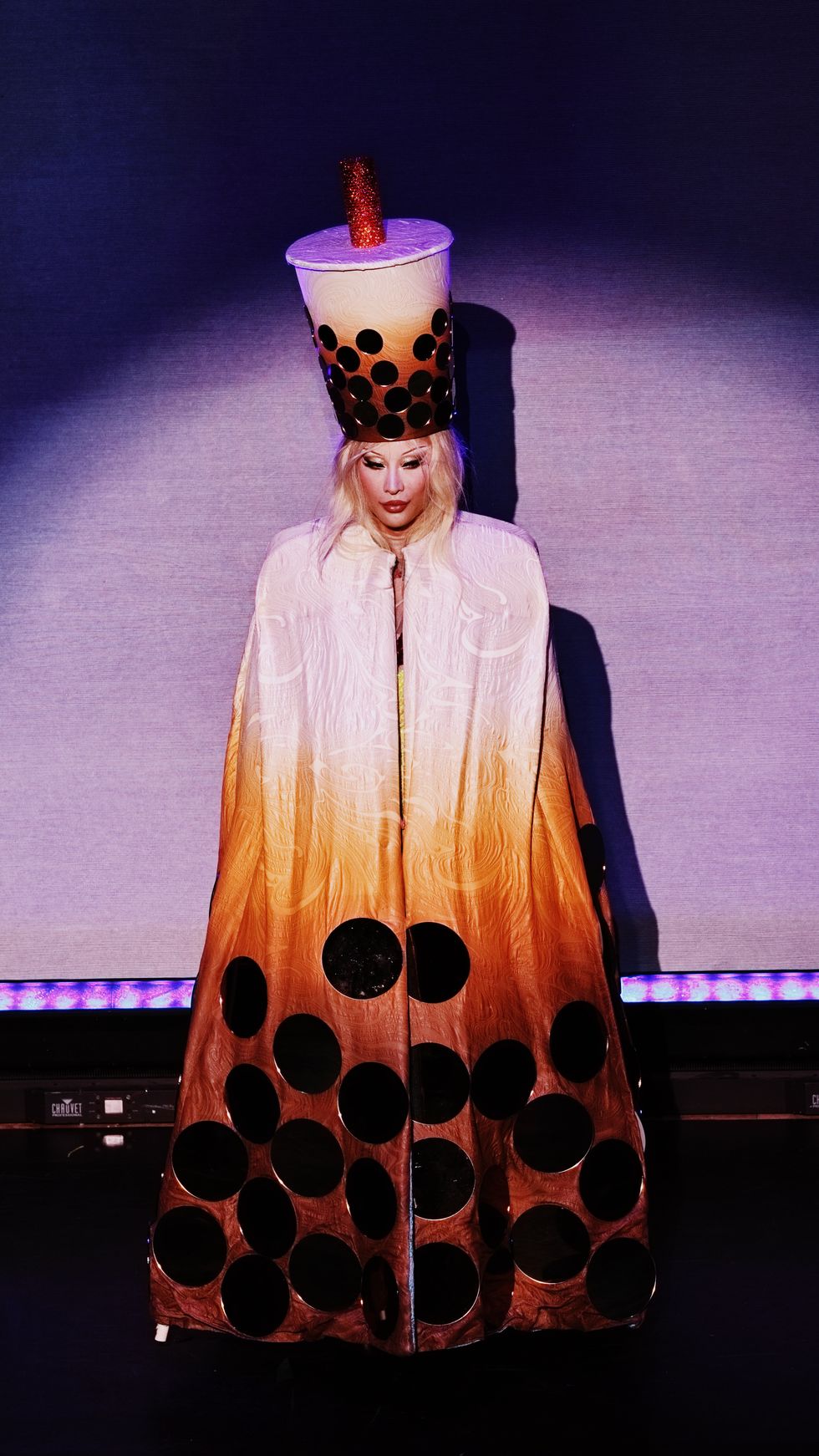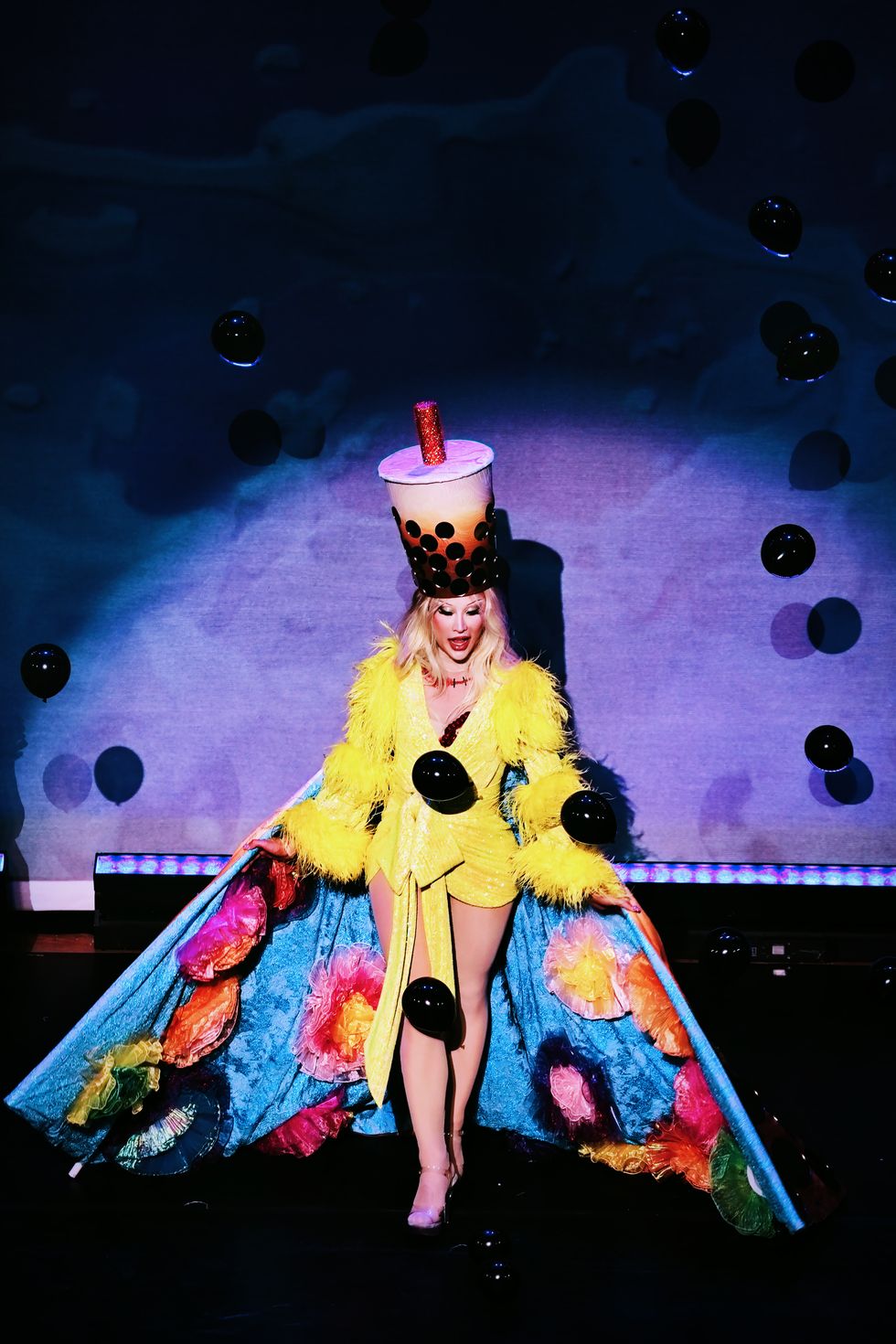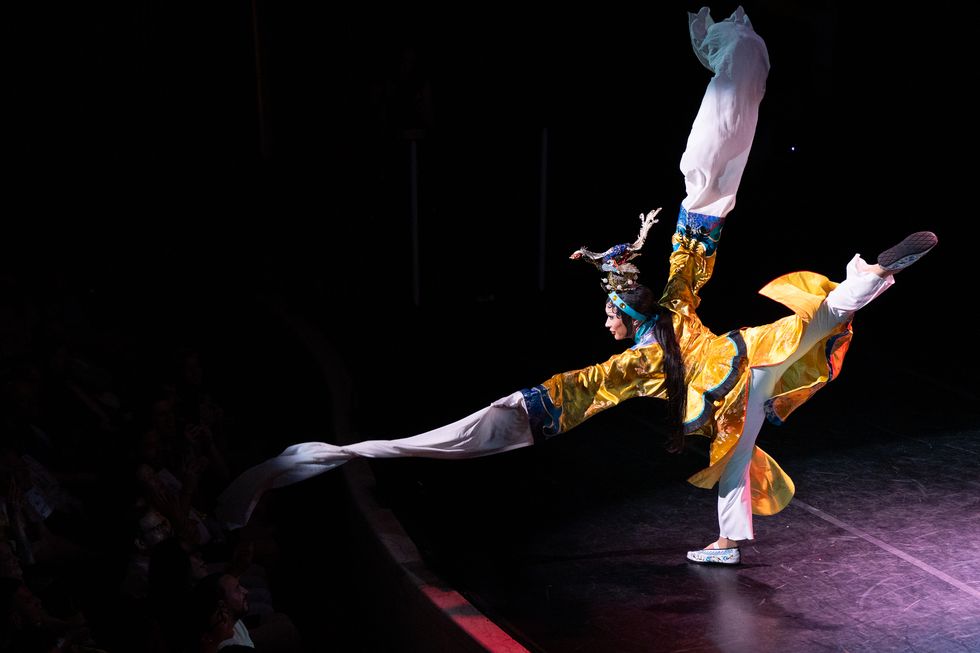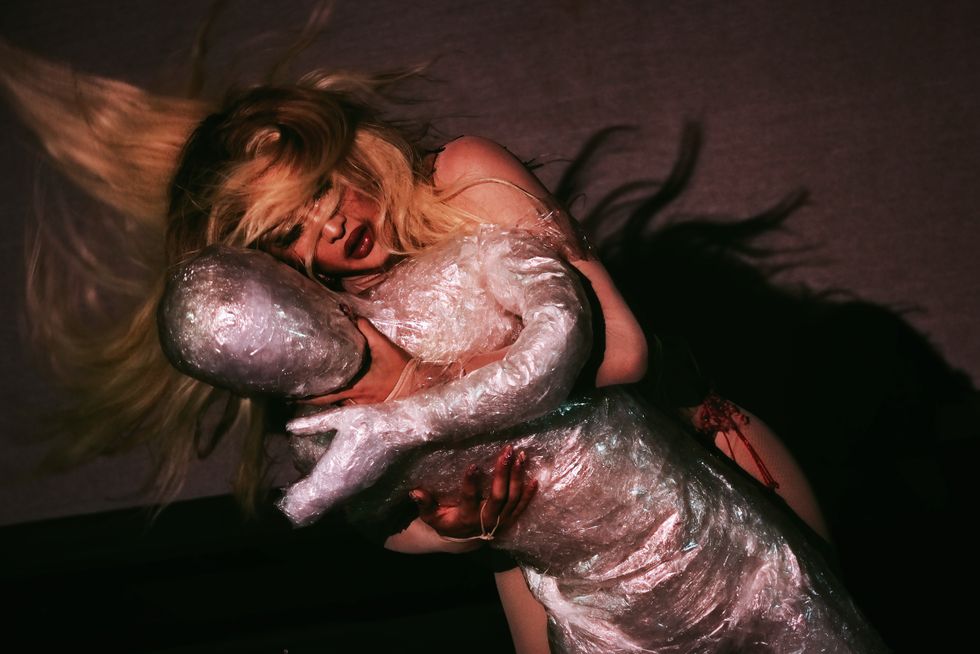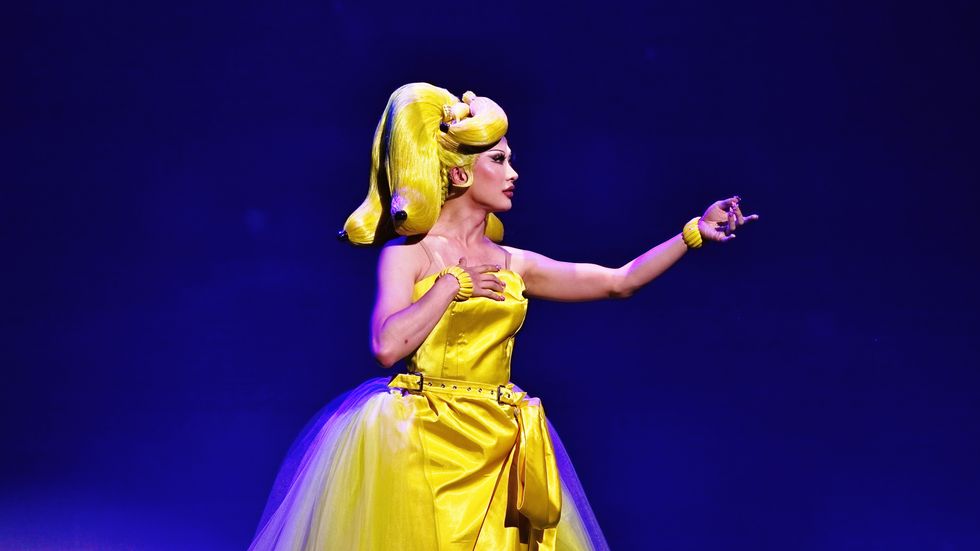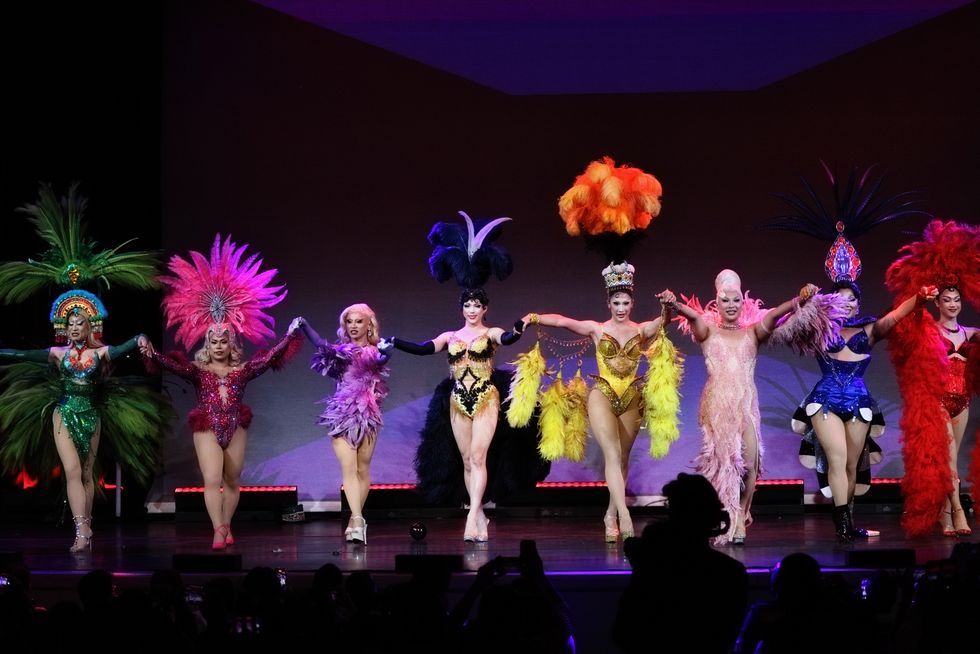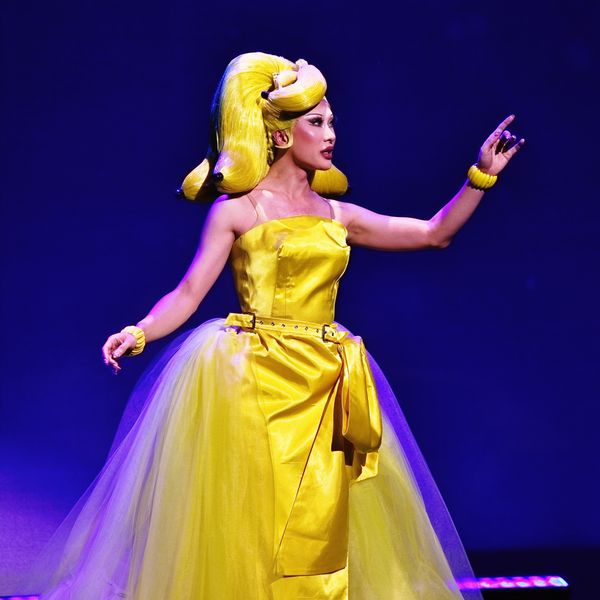
Boba, Bananas and Queer Asian Joy: Inside Nymphia Wind's World
By Jason Ve
Jul 17, 2025Boba, bananas and Peking opera: an unexpected combination — but all present in Nymphia Wind’s joyfully chaotic, boundary-breaking debut theater show, BANANAS?, which took over Town Hall during Pride in New York. A fever dream of extravagant costumes, irreverent humor and cultural homage, the show was exactly what it promised: bananas. But beneath the carefully orchestrated chaos was something deeper — a bold, defiant celebration of queer Asian identity, performed with craft, camp and care by one of the most singular drag artists of today.
Nymphia made history in 2024 on RuPaul’s Drag Race Season 16 as the first Taiwanese and East Asian queen to take the crown. Nymphia’s impact isn’t just about breaking records — it’s about redefining what drag can look like when it’s unapologetically cultural. Her drag is unmistakably her own: whimsical yet rooted, drawing from Taiwanese tradition and avant-garde fashion to build something that feels both intimate and operatic.
Boba, the national drink of Taiwan (and arguably of Asian America), has become a symbol for Nymphia. So it was fitting that, during BANANAS?, she brought out the balloon-filled boba dress that made jaws drop on the Drag Race finale. The whole theater gasped — and boy was it satisfying.
The show had introspective moments, with Nymphia changing onstage in silence — a deliberate choice. “It’s questioning what’s behind the peel,” she tells PAPER. In one sequence, she’s auctioned off, peeled and “sewn together,” symbolizing the emotional toll of constant performance. “People expect you to show up and show out… while you’re being torn apart.”
Yet even in its rawest moments, BANANAS? radiated queer Asian joy — on stage and in the crowd. “It’s definitely shifted to something quite powerful,” she says, reflecting on her growing connection to the Asian American community. “[People] come up to me and speak about how they feel so seen and represented, because growing up, you don’t really see a lot of Asian representation. I mean, now it's still lacking. So to be represented as a winner is symbolically very important for us as a community.”
At Town Hall, a historic venue founded by suffragists, Nymphia carved out space for queer Asian voices.
BANANAS? felt like a love letter — to queer people of color, to immigrants, to introverts, to anyone who’s ever longed to see themselves not just represented but centered, celebrated and fabulous as hell.
Nymphia credits her mother, Mimi, for shaping her meticulous approach to drag. “One thing my mom taught me is to be detail-oriented; she was a demon about it,” she laughs. Even queens, though, have their limits. Asked what she would do if boba and bananas were outlawed tomorrow, Nymphia doesn’t hesitate: “I would just quit drag.”
She continues to build something extraordinary — a drag legacy that’s deeply cultural and personal. Below, Nymphia (born Leo Tsao) sits down with PAPER to peel back the layers on how her roots shape her drag, the vision behind her NYC theater debut — and, in true BANANAS? fashion, why she doesn’t even like eating bananas in real life.
Let’s start with your first-ever headlining theater show in New York at Town Hall. What was going through your head when you stepped onto that stage?
It's such an iconic space, and it was created by suffragists — as a place to speak up and to have conversations about society and equality. So it felt iconic to be invited by Town Hall to do a Pride show at their space, and it felt really special, being Asian, to voice our existence in that space. So, I was excited to step onto the stage.
You've performed all over, but I'm curious, how did the crowds in New York compare to the ones in Taiwan? Is there a different kind of energy?
Oh, for sure. In New York, not to be shady — I don't think it's shady — but they get a lot of drag, so they're a little harder to please because they’ve seen so much. But in Taiwan, before getting on Drag Race, they didn’t necessarily understand the art form of drag. You have to interact with the crowd, build a relationship with them and then they'll be there for you. But after Drag Race, I reached into a different crowd. The crowd now in Taiwan is more understanding of the art form of drag and how drag is performed. I remember after getting on the show, the crowd’s reaction changed. It just felt very loving, and the energy was positive and very special.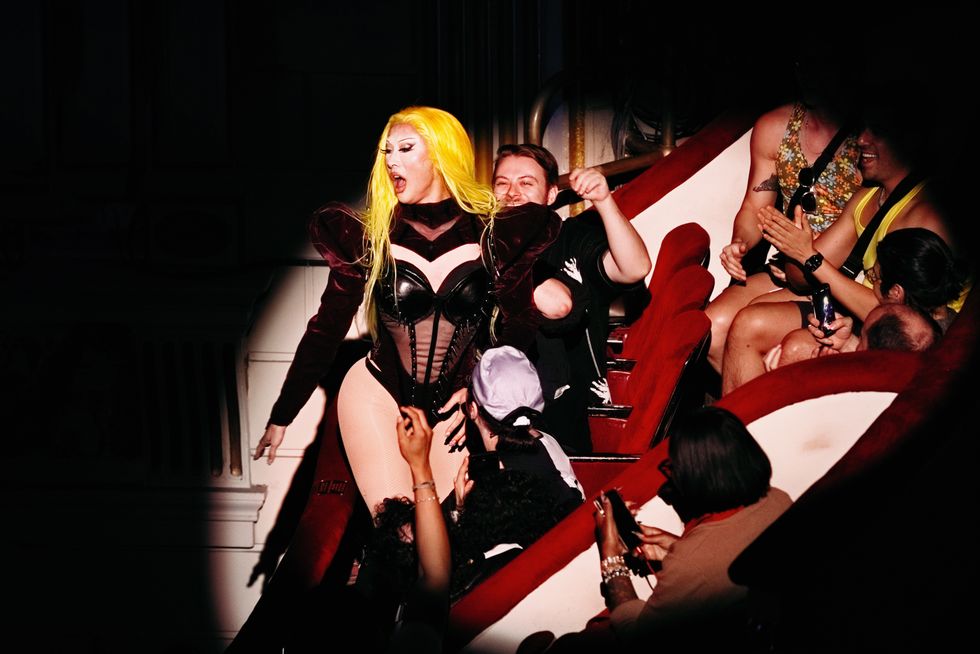
I watched your documentary on YouTube and was so moved by your relationship with your mom. What's one thing your mom taught you that has stuck with you?
One thing my mom taught me is to be detail-oriented; she was a demon about it. Always with cleaning the house, for instance, but it would never be good enough for her. She can tell you all the spots you missed.
That example is so real. My mom examines my home’s cleanliness when she visits, sees every spot I missed and re-cleans it, even if a cleaner had just come. Can you share a recent favorite moment with her?
I went with her to Antarctica in December, and recently she’s been in the UK caring for my brother’s kid, and getting to go visit her, my nephew and my brother was a sweet moment. My mom being present, supportive and giving us space to explore ourselves has really shaped who I am today.
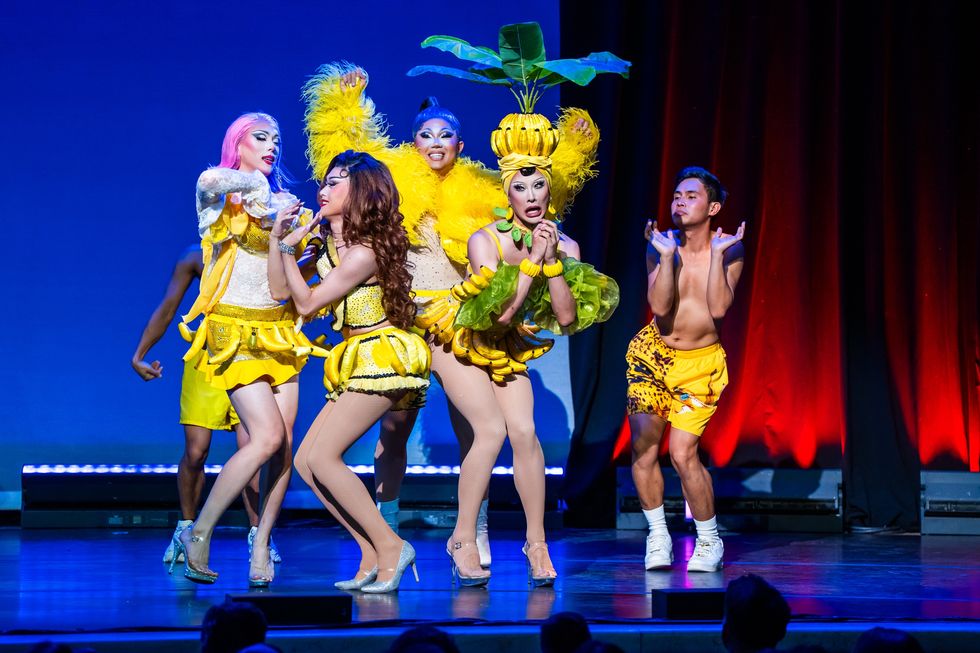
Your roots — queer, Taiwanese, Asian — are so integral to your drag. How do those identities show up in how you perform and what you want to communicate to the world?
First, the face paints and the Peking opera elements are a pretty obvious way of incorporating my culture into my drag. But also, the performances I curate — back in Taiwan, I’d produce shows in temples or on electric flower cars. Those are very Taiwanese elements.
For me, it's about how we combine drag performances with culture and cultural behaviors. Or things we do as a culture and incorporate that with drag. Growing up in Asia, we’re educated differently and the way we interact, the way we do drag, is innately different than your American drag queen. Most notably on Drag Race, people know me as not talking about my talents. It’s an example of what I mean by being cultured differently. In America, you're brought up to be so vocal about yourself, to be an individual, to speak up for yourself, to share what your talents are, and to always be vocal about that. But growing up in Asia, you're really taught to keep to yourself, to consider other people, to be a crowd and a group rather than an individual, and to not boast about your talents or speak about yourself in a certain way.
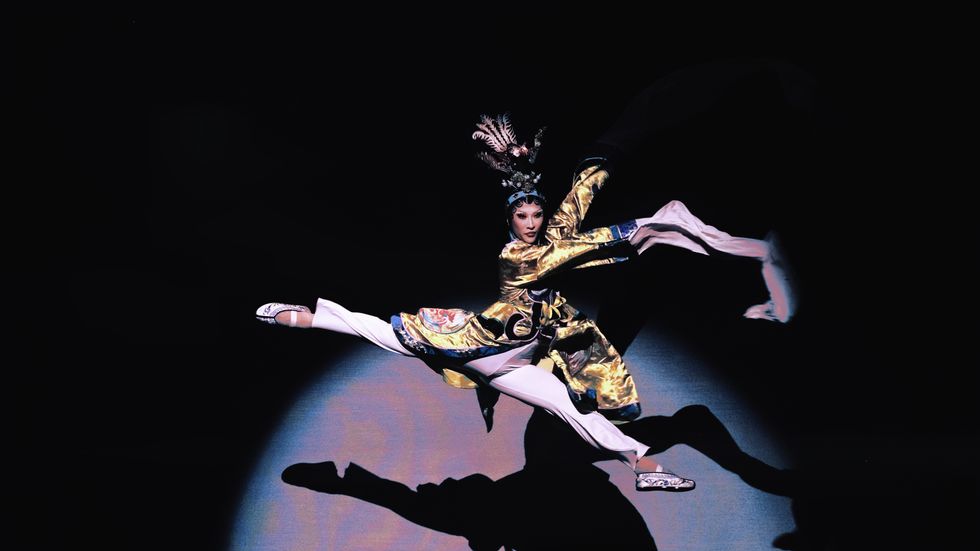
Yeah, your performance at Town Hall spoke to me, especially as a Chinese Vietnamese American, as at the end of the show, you revealed that you're an introvert, which I am too. And I realized that if I did drag myself, well, it wouldn't be as good as you, but it would look like yours in the sense that I wouldn’t want to talk too much, too. I noticed you had a host and others on stage — was that intentional, to let the performance speak for itself?
Yeah, definitely. It's not that I can't talk. I just get into certain moods on different days, and sometimes I can't. Sometimes I have a brain fart and blank out. It's hard to predict. So I rather have a host and focus on the show and then I'll just chime in when I feel like it — to have that freedom of choice.
Totally.
I'm so unpredictable.
What was unique is that you set up some of the looks on stage. Was that a deliberate choice to let the audience see the process?
Oh yeah, absolutely. With BANANAS?, it's questioning what's behind the peel. It's not really about the bananas — it's about the question mark. And why am I even a banana? With Drag Race, they built up an image of me and people perceive me to be a certain way. And then being so seen, but is Leo or Nymphia really seen as a person?
I initially wanted to do a full-on conceptual show for Town Hall, but due to time restraints and my travel schedule, it was really hard. So the first 20 minutes of the show were the direction I was aiming for BANANAS?. The no music, and just me getting changed and unchanged on stage, was very deliberate. There's something really raw, open, vulnerable and direct about it. There’s the brutality of an auction of being bid on; it seems so fun and exciting and the [winning bidder] comes up, they peel me and I'm suddenly all bleeding and sewn together. People don't really see what we go through mentally when we go do these things, when we're gigging.
Not to say I'm not super grateful that I get to do what I love and to travel the world, and to share drag art and to see people so excited — but having to physically and mentally do that, and being flown around every weekend, is really hard and very taxing on the mind and physical body, and you're constantly tired. And people expect you to show up and show out and to do all these things while you're being torn apart.
Now when you explain it, it all makes sense.
We start off the show pretty depressing, and you feel this sad undertone where you see the pain a person goes through, but through drag you find a certain passion where you transform that pain into power, drive and motivation.
“Wind” in Mandarin 风 (fēng) is also [a homophone] for “crazy” 疯 (fēng) — it sounds the same. So BANANAS? to me is also crazy. So the second half of the show is more about — oh my god, that's bananas!
When was the last time you ate a banana?
Whenever I had my last gig. I can't remember.
In Seattle?
Yeah.
But wait, do you only eat it on stage?
Generally I don't like buying bananas because they ripen too easily, and I just don't know what to do with them because I don't like overripe bananas. So I generally just have bananas when I'm at the gig because they usually prepare bananas for me.
That's a shocker. I thought you eat them every day.
Oh.
What emoji do you trust the least?
Maybe the nodding emoji. I don't know why I don't trust that one. It just seems very neutral, but also you're kind of agreeing, but like why are you agreeing? I don't know. I don't trust that one.
At the Town Hall show, I looked around the room and it was packed with queer Asian joy. Literally every queer Taiwanese New Yorker I know was there. How has your relationship with the queer Asian American community shifted since winning Drag Race?
It's definitely shifted to something quite powerful, because literally [people] come up to me and speak about how they feel so seen and represented, because growing up, you don't really see a lot of Asian representation. I mean, now it's still lacking. So to be represented as a winner is symbolically very important for us as a community. I found it really interesting that immigrants also come up to me and speak on how they feel so seen because they see that journey of being an immigrant in me too.
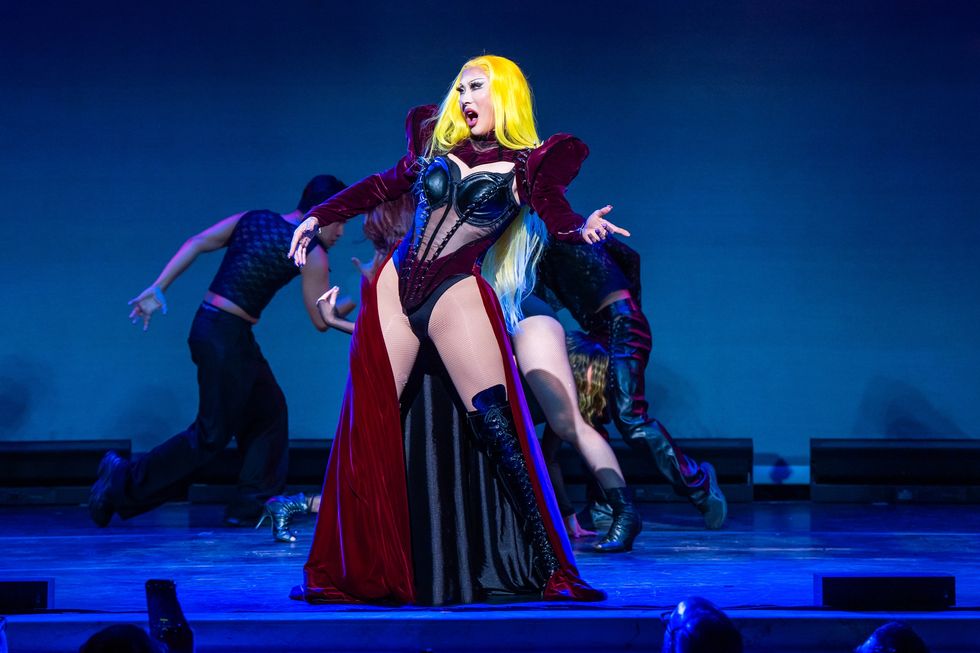
To be honest, this conversation, your headline show, you winning Drag Race — for some years back I didn’t think this was possible because of our place in America.
Yeah. It’s hard as an Asian person because we don't really speak out. We're under the triangle, but we don't really do anything about it. And we're kind of on the sidelines.
Well, not any more. You made history as the first East Asian that won Drag Race, you won across all of the Queens, you came out on top! Your boba balloon dress was iconic on Drag Race. Why did you decide to bring that to life again during your headline show? Do you do that every time?
[Nymphia looks bashful and slightly uncomfortable with praise.] No, that was my first time doing it. It was in New York and that outfit is heavy, so it's not travel friendly. So that was the only time I could do it.
I feel special now, getting to see it live.
Yeah, I took it out because in BANANAS?, we're questioning what you see on the outside and what you don't see on the inside. And with the bubble tea thing, people know me for that. It's instantly symbolic of what Nymphia is. I had to use those symbols in the Town Hall show to really get to the point of what I wanted to explore.
What's your go-to boba order?
My favorite order is taro balls and tea because I don't drink milk. They don’t really have taro balls here, but there's a place called Meet Fresh. They have taro balls, sometimes I go there.
The show was described as a one-woman show, but you brought out so many queens from Taiwan, and New York legends like Shequida. Did you always decide you were going to do that? And how did you decide who to include in this moment with you?
Well, originally it was going to be a one-woman show, but we didn't really have the time or the team to execute such a thing in a short amount of time. So we just did it as a drag show vibe and I found out that three of my Taiwan sisters were going to be in New York. So I invited them. I already knew these Asian drag queens in New York, so I also invited them. And I love Shequida's hosting, so it was a no-brainer. And then we just put a drag show together.
Did you actually pay Shequida only $150 for her appearance at Town Hall [as she claimed during the show]?
No!
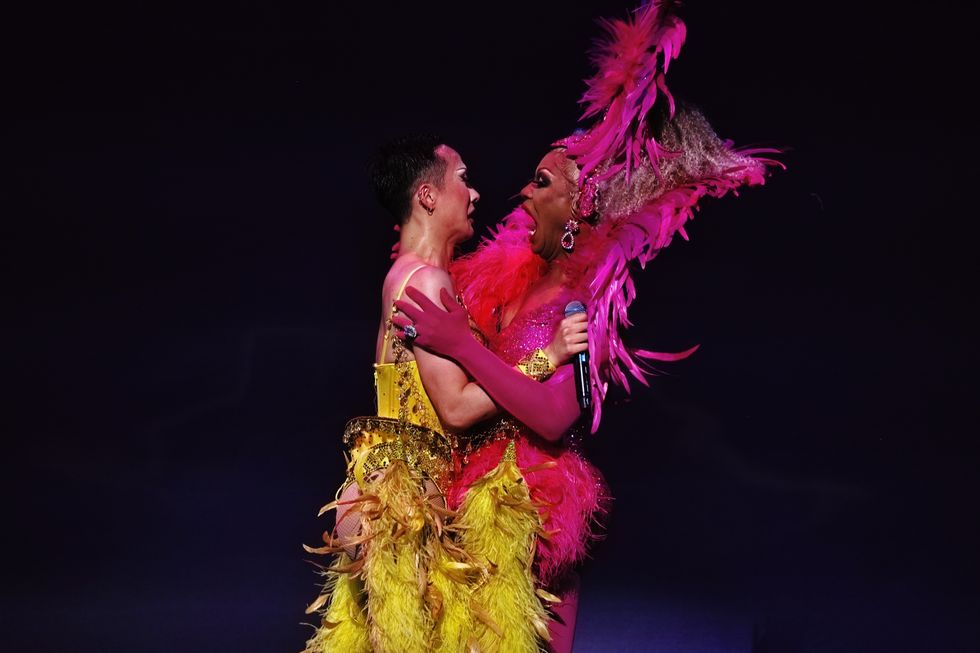
When you're not in drag, what are you wearing?
Hobo clothes. Very pedestrian, very low maintenance and very yellow.
If you were a noise, what would it be?
Dead silence.
What's one thing you brought from Taiwan to your New York apartment that makes it feel like home?
Maybe my rabbit toy that has been with me for like almost 20 years.
What's the weirdest DM you've gotten since Drag Race?
Oh, so many sexual DMs. Just weird messages. They're usually very long, but sometimes I read through them because they're kind of entertaining.
What scent would the Nymphia Wind perfume have?
Banana scent, or Chinese New Year red pocket scent. I'm obsessed with that red paper smell. Banana flower, banana nectar, if that is a thing. Eucalyptus rose.
We need to get you a perfume deal.
Yes.
If you could describe how you're feeling right now in a song, what song would that be?
Probably something from FKA twigs, or Nina Simone’s “Wild Is The Wind.”
If your drag were a street food, what would it be and why?
It'll be stinky tofu because I am a rotted, marinated soft tofu. Fried hard on the outside, soft on the inside.
If boba and bananas were outlawed tomorrow, what would your next personality trait be?
I would just quit drag. I don't know what I would be. I can’t.
When the wigs are off, the lights are out, and you're back in your sweats, who is Nymphia Wind really? You never answered this question in your NY show, so I have to ask.
Who is really Nymphia? Well… she would be in the closet. So the real person would be Leo, and I don't know. It's kind of cringe saying who I am to people. I feel like you have to find that out and explore. And unfortunately, it's not for everyone to experience because not everyone can get to hang out with me for a week, you know?
I could give you words that describe me, but I feel like a person has to be experienced, right? If I give you a word, you build up this perception of me. I’m trying to escape the perception, I guess.
There's layers to everyone and sometimes you just need to spend time with them — to get the answer to that question. What's next for the Banana Queen?
Banana Queen is going to have a holiday because she is rotten bananas — and she needs to be reborn into a green banana. I want to take a break and feel inspired again. And obviously I'll still be gigging, but I want to go in the direction of producing more culturally informed and inspired drag shows and do more with Taiwan. I want to be a cultural ambassador. I want to have a cultural impact. I want to preserve traditional craft. So, we'll see. There's so much to explore.
If this is what rotten looks like, the world better brace itself for your green-banana renaissance.
Story: Jason Ve
Photography: Crystal Li, Anthony Mulcahy
From Your Site Articles
Related Articles Around the Web
MORE ON PAPER
ATF Story
Madison Beer, Her Way
Photography by Davis Bates / Story by Alaska Riley
Photography by Davis Bates / Story by Alaska Riley
16 January
Entertainment
Cynthia Erivo in Full Bloom
Photography by David LaChapelle / Story by Joan Summers / Styling by Jason Bolden / Makeup by Joanna Simkim / Nails by Shea Osei
Photography by David LaChapelle / Story by Joan Summers / Styling by Jason Bolden / Makeup by Joanna Simkim / Nails by Shea Osei
01 December
Entertainment
Rami Malek Is Certifiably Unserious
Story by Joan Summers / Photography by Adam Powell
Story by Joan Summers / Photography by Adam Powell
14 November
Music
Janelle Monáe, HalloQueen
Story by Ivan Guzman / Photography by Pol Kurucz/ Styling by Alexandra Mandelkorn/ Hair by Nikki Nelms/ Makeup by Sasha Glasser/ Nails by Juan Alvear/ Set design by Krystall Schott
Story by Ivan Guzman / Photography by Pol Kurucz/ Styling by Alexandra Mandelkorn/ Hair by Nikki Nelms/ Makeup by Sasha Glasser/ Nails by Juan Alvear/ Set design by Krystall Schott
27 October
Music
You Don’t Move Cardi B
Story by Erica Campbell / Photography by Jora Frantzis / Styling by Kollin Carter/ Hair by Tokyo Stylez/ Makeup by Erika LaPearl/ Nails by Coca Nguyen/ Set design by Allegra Peyton
Story by Erica Campbell / Photography by Jora Frantzis / Styling by Kollin Carter/ Hair by Tokyo Stylez/ Makeup by Erika LaPearl/ Nails by Coca Nguyen/ Set design by Allegra Peyton
14 October
